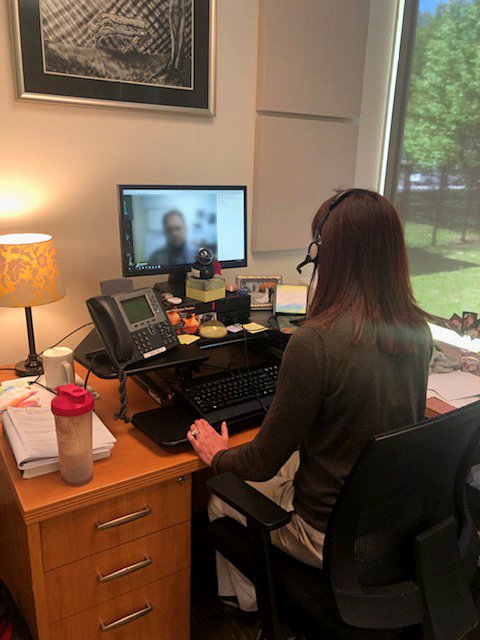Wellness Center expands access to mental health services online
Wellness Center expands access to mental health services online

As students do every year around this time, many feel rising levels of anxiety over grades, graduation and the prospect of finding a job.
All of which is compounded by the ongoing COVID-19 pandemic and stressors related to it: extended quarantine, separation from family and friends, rising unemployment and fears of a global recession.
To help allay anxiety, and to provide students options for coping with it, Rowan University’s Wellness Center has expanded access through virtual and telephone counseling.
“Now is the time when some students think ‘oh my gosh, I’m going to fail a class,’ or, ‘I’m not going to get a job’,” said Dr. Amy Hoch, associate director of the Wellness Center. “Some are stressed over having to be home when they don’t want to be there.”
For many, she said, simply being forced to return to their parents house has caused a variety of stressful situations for many college students, from interaction with siblings to a loss of privacy.
“One of the biggest challenges with telehealth is finding a private space to speak,” said Hoch (pronounced “hoke”). “Often, students go out to their cars to speak if they don’t have a private space. We’ll do Webex sessions from their room but that too can present challenges if students feel it isn’t private enough.”
Still, she said, many students find that remote counseling sessions, individual or as part of a group, are greatly beneficial. As many as 120 Rowan students per week take advantage of individual teletherapy sessions through the Wellness Center and many more benefit from group meetings.
Hoch said Rowan’s Wellness Center has 17 full-time therapists, two of whom were hired since January, and one half-time therapist.
While many of the center’s services, except for emergencies, are now offered only through remote sessions, a great many remain available to students including medical consultations and pet therapy.
The many coping and anti-stress skills offered by counselors include advice on meditation, which can help focus and quiet the mind - an especially useful tool, especially during anxious periods, exercise and maintaining proper nutrition, all of which helps promote mental and physical health.
“Getting enough sleep, doing some kind of exercise, getting proper nutrition and avoiding drugs and alcohol are all very important in reducing stress,” Hoch said. “People’s sleep patterns are hugely affected right now so if you can get into a regular sleep routine it’s really important. Getting out, taking walks and exercising are natural anti-depressants and can help regulate sleep.”
Hoch said if students currently in therapy feel especially anxious or depressed they may also speak with a Wellness Center psychiatrist.
“For many people, medication can add benefits to therapy,” she said. “We have two psychiatrists at the Wellness Center and if we think a patient can benefit from medication that’s available now as well.”